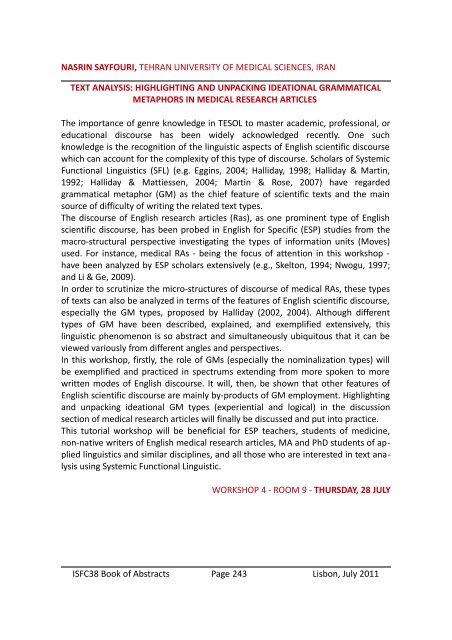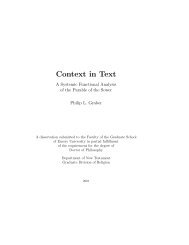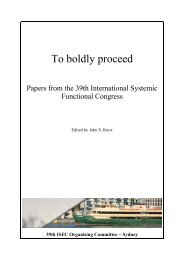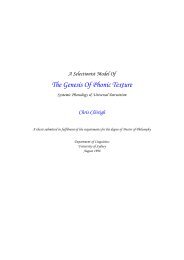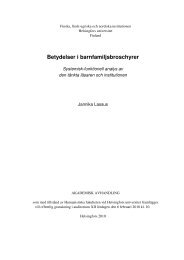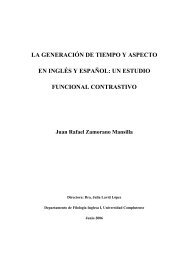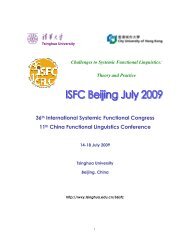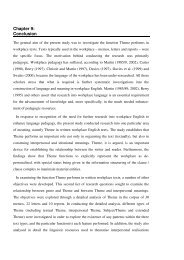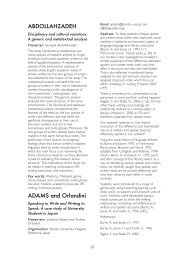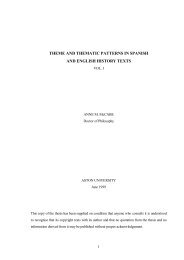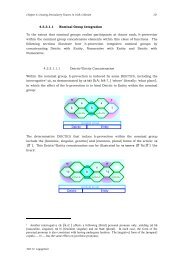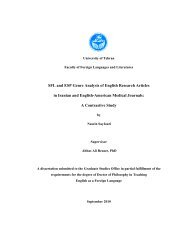- Page 1 and 2:
BOOK OF ABSTRACTSISFC38Negotiating
- Page 3 and 4:
WelcomeAs the convenor of the 38 th
- Page 5 and 6:
Congress VenueFACULDADE DE LETRAS D
- Page 7 and 8:
JAMES R. MARTIN, UNIVERSITY OF SYDN
- Page 9 and 10:
J. LACHLAN MACKENZIE, ILTEC-INSTITU
- Page 11 and 12:
ORLANDO VIAN JR., FEDERAL UNIVERSIT
- Page 13 and 14:
Paper PresentationsADEGBOYE ADEYANJ
- Page 15 and 16:
AIYOUB JODAIRI PINEH, THE UNIVERSIT
- Page 17 and 18:
http://www.grammatics.com/appraisal
- Page 19 and 20:
ALEXANNE DON, UNIVERSITY OF SYDNEY,
- Page 21 and 22:
ALICE CAFFAREL, THE UNIVERSITY OF S
- Page 23 and 24:
ANDREA NINI, ASTON UNIVERSITYSYSTEM
- Page 25 and 26:
ÂNGELA MARIA V. BOAS LEITE, UNIVER
- Page 27 and 28:
Lavid, Julia, Jorge Arus and Juan R
- Page 29 and 30:
ANNE MCCABE, SAINT LOUIS UNIVERSITY
- Page 31 and 32:
ANTÓNIO M. S. AVELAR, FACULDADE DE
- Page 33 and 34:
ARIANNA MAIORANI, LOUGHBOROUGH UNIV
- Page 35 and 36:
AURORA DONZELLI, SLCTOWARDS AN EMAN
- Page 37 and 38:
BEATRIZ QUIROZ, UNIVERSITY OF SYDNE
- Page 39 and 40:
BIRGIT HUEMER, UNIVERSITY OF VIENNA
- Page 41 and 42:
CECILIA COLOMBI, UNIVERSITY OF CALI
- Page 43 and 44:
CHANG CHENGUANG, SUN YAT-SEN UNIVER
- Page 45:
CONGJUN MU, SHANGHAI MARITIME UNIVE
- Page 48 and 49:
DAVID OLATUNDE FIKI-GEORGE, AHMADU
- Page 50 and 51:
DEREK IRWIN, UNIVERSITY OF NOTTINGH
- Page 52 and 53:
DÉSIRÉE MOTTA-ROTH, UNIVERSIDADE
- Page 54 and 55:
ESFL Conference & Workshop, Koper,
- Page 56 and 57:
DORIS LARUBA OBIEJE, AHMADU BELLO U
- Page 58 and 59:
DOROTHY ECONOMOU, UNIVERSITY OF SYD
- Page 60 and 61:
ELAINE ESPINDOLA, THE HONG KONG POL
- Page 62 and 63:
ELISSA ASP, SAINT MARY´S UNIVERSIT
- Page 64 and 65:
ELIZABETH WALKER, HK INSTITUTE OF E
- Page 66 and 67:
ESZTER SZENES, THE UNIVERSITY OF SY
- Page 68 and 69:
FAN DAI, SUN YAT-SEN UNIVERSITYTHE
- Page 70 and 71:
FEDERICO NAVARRO, UNIVERSIDAD DE BU
- Page 72 and 73:
FLORIAN HISS, UNIVERSITY OF TROMSØ
- Page 74 and 75:
FUJITA TORU, GRADUATE SCHOOL, DOSHI
- Page 76 and 77:
GERARD O'GRADY, CARDIFF UNIVERSITYP
- Page 78 and 79:
GERSINEY PABLO SANTOS, UNIVERSIDADE
- Page 80 and 81:
GORDON TUCKER, CARDIFF UNIVERSITY´
- Page 82 and 83:
GUO SONGDAN, THE HONG KONG POLYTECH
- Page 84 and 85:
HONG HUAQING, NATIONAL INST. OF EDU
- Page 86 and 87:
Machin, David (2007): Introduction
- Page 88 and 89:
IRENE PASCUAL, UNIVERSIDAD AUTÓNOM
- Page 90 and 91:
JACQUELINE FIUZA DA SILVA REGIS, UN
- Page 92 and 93:
JANE HELEN JOHNSON, UNIVERSITY OF B
- Page 94 and 95:
London: Continuum.Taverniers, M. (2
- Page 96 and 97:
JIM DONOHUE, OPEN UNIVERSITYTEXT AN
- Page 98 and 99:
JOANNE NEFF-VAN ARTSELAER, UNIVERSI
- Page 100 and 101:
JOÃO BOSCO FIGUEIREDO-GOMES, UNIVE
- Page 102 and 103:
JOSÉ MANUEL DURAN, UNIVERSIDAD DE
- Page 104 and 105:
KAREN MALAN, LONDON METROPOLITAN UN
- Page 106 and 107:
KEIZO NANRI, OITA UNIVERSITYQUARREL
- Page 108 and 109:
KHALID KHALAF ALKHALAF, INSTITUTE O
- Page 110 and 111:
LEILA BARBARA, PUCSP/CNPQ, BRAZILC
- Page 112 and 113:
LEN UNSWORTH, UNIVERSITY OF NEW ENG
- Page 114 and 115:
LEONARDO PEREIRA NUNES, FEDERAL UNI
- Page 116 and 117:
LIBO GUO, NANYANG TECHNOLOGICAL UNI
- Page 118 and 119:
LILI CAVALHEIRO, ULICES / FACULTY O
- Page 120 and 121:
LUÍSA ÁLVARES PEREIRA, UNIVERSIDA
- Page 122 and 123:
MAKOTO SASAKI, AICHI GAKUIN UNIVERS
- Page 124 and 125:
MARIA ANTÓNIA COUTINHO, CLUNL, UNI
- Page 126 and 127:
MARIA APARECIDA CALTABIANO SILVA, P
- Page 128 and 129:
MARIA GORETI MONTEIRO, INSTITUTO PO
- Page 130 and 131:
MARÍA MARTÍNEZ LIROLA, UNIVERSITY
- Page 132 and 133:
MARIA MEDIANEIRA DE SOUZA, UNIVERSI
- Page 134 and 135:
MÁRIO MARTINS, ILTEC, UNIVERSIDADE
- Page 136 and 137:
MARK SHIU KEE SHUM, FACULTY OF EDUC
- Page 138 and 139:
MARTIN KALTENBACHER, UNIVERSITY OF
- Page 140 and 141:
MASAMICHI WASHITAKE, AICHI GAKUIN U
- Page 142 and 143:
MELANI NEKIC, JUSTUS-LIEBIG UNIVERS
- Page 144 and 145:
and New York: Routledge.Kress, G.,
- Page 146 and 147:
MICHAEL O'TOOLE, MURDOCH UNIVERSITY
- Page 148 and 149:
MIZUSAWA YUMIKO, KANAGAWA UNIVERSIT
- Page 150 and 151:
MONIQUE FROBERT-ADAMO, UNIVERSITÉ
- Page 152 and 153:
NASRIN HADIDI TAMJID, ISLAMIC AZAD
- Page 154 and 155:
NATALIA IGNATIEVA, UNIVERSITY OF ME
- Page 156 and 157:
PALLAM LAKSHMI NARASA DASU, THE ENG
- Page 158 and 159:
PATRICIA PAUGH, UNIVERSITY OF MASSA
- Page 160 and 161:
PATRICK KIERNAN, MEIJI UNIVERSITY,
- Page 162 and 163:
capital city of China, besides econ
- Page 164 and 165:
QI-LONG CHENG, SHANGHAI UNIVERSITYF
- Page 166 and 167:
RICCARDO GIOMI, INSTITUTO DE LINGU
- Page 168 and 169:
ROBIN FAWCETT, CARDIFF UNIVERSITY,
- Page 170 and 171:
Reutledge.Kress, G. et al. (2001).
- Page 172 and 173:
SAEIDEH AHANGARI, ISLAMIC AZAD UNIV
- Page 174 and 175:
SALVIO MARTÍN MENÉNDEZ, UNIVERSID
- Page 176 and 177:
SILVIA PESSOA, CARNEGIE MELLON UNIV
- Page 178 and 179:
SOLANGE TERESINHA RICARDO DE CASTRO
- Page 180 and 181:
SONJA STARC, UNIVERSITY OF PRIMORSK
- Page 182 and 183:
STELLA NEUMANN, RWTH AACHEN UNIVERS
- Page 184 and 185:
London/New York: Longman. S. 232-27
- Page 186 and 187:
SUE SPINKS, MACQUARIE UNIVERSITY, A
- Page 188 and 189:
TAMMY SLATER, IOWA STATE UNIVERSITY
- Page 190 and 191:
TERESA CASTINEIRA, BENEMÉRITA UNIV
- Page 192 and 193: TOM BARTLETT, CARDIFF UNIVERSITYAMJ
- Page 194 and 195: VERALUCIA GUIMARÃES DE SOUZA, PPGL
- Page 196 and 197: VIOLETA QUENTAL, PONTÍFICA UNIVERS
- Page 198 and 199: VIVIANE DE MELO RESENDE, UNIVERSIDA
- Page 200 and 201: Halliday, Michael Alexander Kirkwoo
- Page 202 and 203: Context in Functional Linguistics.
- Page 204 and 205: XINGHUA LIU, UNIVERSITY OF READINGA
- Page 206 and 207: ZOHRE SEIFOORI, ISLAMIC AZAD UNIVER
- Page 208 and 209: teachers to engage all students and
- Page 210 and 211: learners. Research in Australia fou
- Page 212 and 213: CRISTIANE FUZER, UNIVERSIDADE FEDER
- Page 214 and 215: eality show.3. Sara Regina Scotta C
- Page 216 and 217: Considering the above description,
- Page 218 and 219: This paper aims at looking into the
- Page 220 and 221: disseminate subject knowledge in bo
- Page 222 and 223: HIRAM MAXIM, EMORY UNIVERSITYSTUDEN
- Page 224 and 225: discourses in the discipline. The c
- Page 226 and 227: Lanham, MD: Rowman & Littlefield.Ca
- Page 228 and 229: Thompson (eds.) Evaluation in Text:
- Page 230 and 231: sophisticated theory like SFG, and
- Page 232 and 233: Martin, J. R., & Rose, D. (2005). D
- Page 234 and 235: PAULINE JONES, UNIVERSITY OF WOLLON
- Page 236 and 237: 3. Lorraine McDonald (Australian Ca
- Page 238 and 239: TERESA OTEÍZA, PONTIFICIA UNIVERSI
- Page 240 and 241: Sciences, one of the aspects focuse
- Page 244 and 245: PETER R. R. WHITE, UNIVERSITY OF NE
- Page 246 and 247: mentioning previous studies on Them
- Page 248 and 249: Fawcett, Robin. P., 2009. ‘Seven


